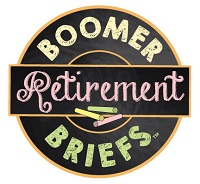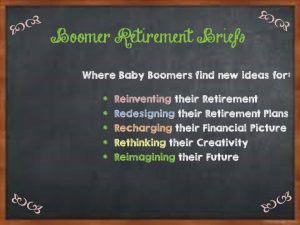A recent headline in the USA Today caught my attention: They Won’t Quit (January 24, 2012). This cover article portrayed several “seniors” who continue to work and thrive despite their advanced years. The were working in their 80s! There seems to be an expectation that more and more Baby Boomers will follow suit and continue to work well beyond the traditional retirement age. The average retirement age for men in the U.S. is 64; for women it’s 62.
This begs a few key questions:
- Will Baby Boomers en masse really want to work in their late 60’s and 70’s and 80’s?
- Will the majority of employers really want to keep old employees or hire new old employees?
- How can the Boomers control their own destiny to work or to retire on their terms?
For every headline heralding how long Boomers will be in the workforce, there is an opposite article. One that lays out the facts for leading-edge Boomers. This group is suffering from unemployment worse than other age groups.
A telling tale about working in your 80s
A front page article in the Wall St. Journal lays the stark facts on the table in “Oldest Baby Boomers Face Job Bust” (December 19, 2011). It reports the unfortunate situation for leading-edge Boomers. Many lost their full-time job during this current recession. And it is taking an average of 56.6 weeks to rejoin the workforce.
That’s an estimated 4.3 million Americans 55 to 64 who are unemployed and looking for full-time work. Or who are working part-time. Still others need a job but have quit looking. Combined, that makes for a 17.4% under/unemployment rate. This is nearly double from 2006. Back then, pre-retirees in the same age band who were under employed or unemployed numbered 2.4 million.
For many of these leading-edge boomers, they have run through savings, unemployment checks and have prematurely tapped retirement savings. Whether they want to work into their 70s and 80s may no longer an option. It may be a stark necessity.
Why such polar opposite points of view?
How can there be such optimism and encouraging stories from one camp of older workers and such anguish and concern about just finding a job from another camp? Initially, I thought these differences might be centered on two criteria: education level and industry. If you were either well-educated or in an industry that embraced older workers, you were set in as you aged throughout your career.
But, that does not appear to be the case. Some very highly educated Boomers have been out of work for years now. While some specific industries accept and value older workers, that doesn’t mean they haven’t had layoffs.
So why are some leading-edge Boomers working successfully and others not? I’ve come to think that it’s about creativity and flexibility. If you are planning to continue to work until you are 80, have you created new opportunities for yourself? Do you have the willingness and tools to begin a new career? Oh, yes, and the flexibility to reset your salary expectations and adjust your lifestyle?
I suspect reinvention may be the formula for many Boomers who want to make contributions outside the home for decades to come.
What is your plan for working into your 80s? Or will you gracefully bow out your candles in your 60s?




